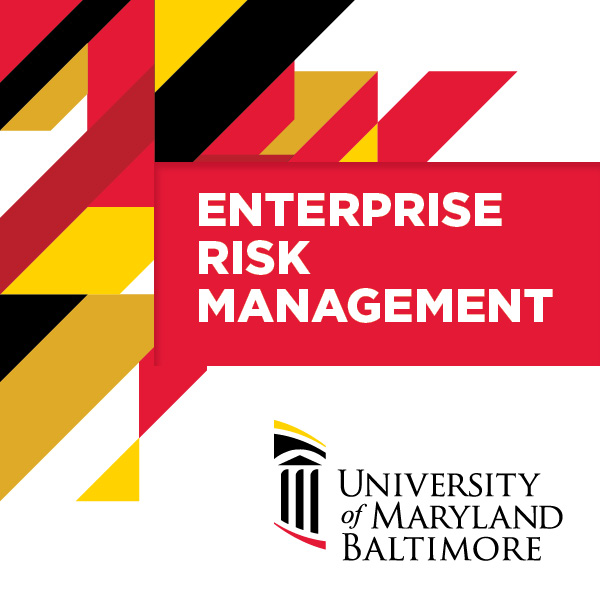A Successful Year for UMB’s Enterprise Risk Management Program
August 02, 2023 UMB Enterprise Risk Management Program
The University makes strides in assessing risks, integrating risk assessment into planning processes, and cultivating a risk-responsible culture.
In Fiscal Year 2023, the University of Maryland, Baltimore (UMB) witnessed significant achievements in its Enterprise Risk Management (ERM) program, which played a pivotal role in advancing the institution’s mission to improve the human condition and serve the public good of Maryland and society at-large.
The UMB ERM program, established over a decade ago, aims to embed, sustain, and support a culture of responsible risk-taking and opportunity identification across UMB. With three key areas of focus aligned with the program’s objectives, UMB made noteworthy strides in assessing risks during FY23, integrating ERM into existing planning processes and cultivating a risk-responsible culture around the University.
“Over time, I am hopeful that the ERM program can improve the ability of individuals across all of UMB’s schools and units to support decision-making that is risk-responsible — but not risk-averse,” said Jon Kucskar, JD, assistant vice president for enterprise risk management and special assistant to the president.
Setting the Foundation of a Risk-Responsible Culture
The first focus area centered on the inauguration of the new risk assessment process. Over several months, the program accomplished its first comprehensive risk assessment in years, marking a significant milestone. Thirty-nine strategic risks were identified and evaluated by appointed risk owners using a new assessment tool with objective rating scales that included the rating of the likelihood, impact, speed of onset, and mitigation. The process involved active participation from individual risk owners, coordinated efforts from ERM staff, and thorough scrutiny from the CALIBRATE Executive Committee chaired by Roger J. Ward, EdD, JD, MSL, MPA, provost and executive vice president, and the ERM Implementation Committee chaired by Kucskar.
Ultimately, the assessment yielded a “top five” and “top 15” list of strategic risks, along with a process to create targeted plans for mitigating specific risks. The final assessment received endorsement from the CALIBRATE Executive Committee and unwavering support from UMB President Bruce E. Jarrell, MD, FACS.
Integrating Enterprise Risk Management into UMB’s Planning Processes
The ERM program successfully integrated an important and novel ERM data collection process into the University’s strategic planning process, providing valuable insights. When each school/unit reported progress toward their strategic goal, an extra one-page module was added to gather data on the largest barrier that the school/unit will face in achieving those goals. Some adjustments have been made to optimize the value of ERM’s inclusion in the strategic planning process. These adjustments were implemented at the end of FY23, with expectations of positive results once more data becomes available at the beginning of FY24.
In addition, the ERM program is now a part of the annual budget planning process that requires deans and vice presidents to identify and address anticipated financial and non-financial risks as part of their annual budget discussions, reinforcing UMB’s ERM efforts.
Fostering a Risk-Responsible Culture Across UMB
The third and equally crucial program focus centered on fostering a risk-responsible culture at UMB. Recognizing that risk is inevitable, especially in an institution focused on research and pioneering advancements in science, health, and justice. ERM played a pivotal role in supporting faculty, staff, and students to identify and assess risks aligning with UMB’s mission.
The formation of two critical committees and countless one-on-one discussions by ERM staff, both internally and externally, contributed to the strengthening of UMB’s risk-responsible culture over the past year. The COVID-19 pandemic posed challenges, but it also served as a catalyst for enhancing the University’s capacity for risk awareness, emphasizing the importance of a risk-responsible approach without being risk-averse.
The ERM program also set the stage for future efforts to address risks identified in this year’s risk assessment process, enhance the value derived from ERM’s integration into strategic planning, and deepen the risk-responsible culture across the institution.
The successful journey of the ERM program over the past year serves as a testament to the institution’s commitment to UMB’s core values of Innovation and Discovery, excellence, risk awareness with responsible risk taking, and continuous improvement in pursuit of fulfilling UMB’s mission.
Learn more about the UMB ERM program and read the full FY23 ERM Annual Report.